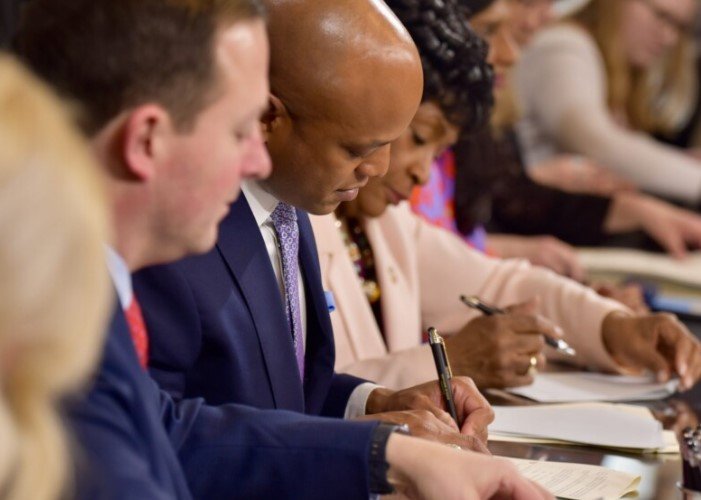In a significant legislative move, Maryland has enacted new laws that extend a helping hand to port workers and honor a historical figure. The recent bill signing ceremony marked the culmination of the 2024 legislative session, where Governor Wes Moore ratified over 120 bills, including pivotal ones that provide financial aid to workers impacted by the Baltimore port disruptions and rename the port to commemorate Helen Delich Bentley.
A Beacon of Support for Port Workers
The legislation comes as a response to the recent collapse at the Francis Scott Key Bridge, which brought to light the vulnerabilities of transportation workers. The new laws aim to cushion the economic blow for those affected by such disruptions. One of the key features of the legislation is the establishment of a permanent scholarship program for the families of transportation workers who have lost their lives on duty. This initiative reflects the state’s commitment to supporting the families of those who serve in these critical roles.

Moreover, the legislation introduces more flexible work search requirements for unemployment insurance, ensuring that those out of work are not unduly burdened during their job hunt. The governor emphasized the need for the administration to remain agile in its response to the collapse, signaling a proactive approach to crisis management.
Honoring a Maritime Legacy
The legislative package also includes a formal name change for the Baltimore port, now designated as the Helen Delich Bentley Port of Baltimore. This change honors Bentley’s extensive contributions to maritime journalism and her service as the chair of the federal Maritime Commission. Her decade-long tenure in Congress representing Maryland’s 2nd District further solidified her legacy, which the state now proudly enshrines.
Former Governor Robert Ehrlich, who initially named the port after Bentley in 2006, attended the signing ceremony. The renaming represents not just a technical amendment in state law but also a tribute to a figure who has left an indelible mark on Maryland’s maritime history.
A Commitment to Continuity and Recovery
The swift passage and signing of these bills underscore the urgency with which Maryland’s government is addressing the aftermath of the bridge collapse. The emergency nature of the bills means they take effect immediately upon the governor’s signature, allowing for prompt aid distribution and the implementation of the new measures.
The governor’s return from a Capitol Hill meeting to sign the bills highlights the coordination between state and federal efforts in recovery and reconstruction. This collaborative spirit is crucial as Maryland navigates the challenges posed by the bridge collapse and seeks to fortify its infrastructure against future crises.

Comments